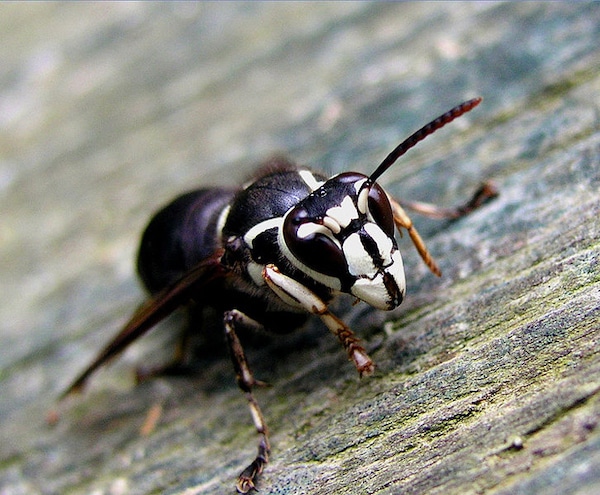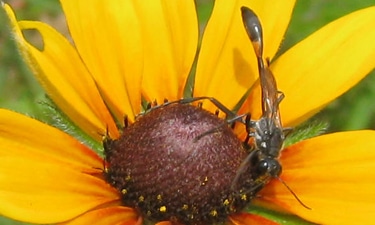Updated: November 15, 2020
I don’t use pesticides or herbicides in my home or garden. I buy mostly organic food. I try not to impress this viewpoint on others.
The only exception is my wife. On most days she’s onboard with my organic viewpoint. But, once in a while, she does complain that it’s hard to buy food for me.
But it pains me to admit that there’s one exception to my “don’t use pesticides rule.” I have a spray can of wasp poison in the basement.
I hate to use it. The same can has been in the basement for probably seven or eight years, so you know I don’t use it very often.
When I do, it’s on a very limited basis.
Let’s take a sec to get the legal words out of the way. This article may contain affiliate links. That means if you click and buy from my partners, I will make a tiny amount of money at no cost to you. This in no way affects my recommendations.
Swelling from an allergic reaction to a wasp sting can stop your breathing.
— Suburban Hobby Farmer
So you understand, I don’t have anything against wasps, hornets, yellow jackets, etc. But I should note that I don’t ever recall being stung by one.
In fact, I attract thousands of them with native plants in an area near my garden. They are great predators. My viewpoint is my garden can use all the predators it can get.
So why do I keep the spray can around?

Once at a neighborhood block party, wasps
Before you call me a hypocrite, let me explain:
When my son was eight we went to our neighborhood block party. It was a late summer day and the kids were running around on the grass.
Out of the corner of my eye, I saw my son scooching down and crying. I thought he had twisted an ankle, but it turns out he had been stung by a wasp on his leg.
At first, we didn’t think much of it. He had been stung twice already that summer.
The previous time his arm had swelled some. But this time we could see it was worse, so we brought him inside the neighbors house and gave him some Benadryl.
Since it didn’t seem to have any effect, we gave him a second dose of Benadryl after about 30 minutes.
Two of my neighbors are nurses at the local hospital and another is a doctor. We were all watching him when his face started to swell. His lips got so big he looked almost like he had a duckbill.
That’s when we decided to take him to the hospital, which was not far from our house.
Epinephrine, a wonder drug
When we got to the hospital the doctor gave him epinephrine (or something like it) and he made an instant recovery.
But I don’t mind telling you that I was plenty scared. It could have easily been much worse. Swelling from an allergic reaction to a sting can stop your breathing.
Now, during the summer and fall, an EpiPen is my son’s constant companion. I wish I had a penny for each time I’ve said “Do you have your EpiPen?”
So when I come across a hornet’s nest, and that’s fairly often, I ask myself if it it’s an aggressive species or not. There are many wasp or hornet colonies that you would never know are there if you don’t threaten them in some way.
Some are solitary wasps that help eliminate hornworms and other bugs that cause problems in my garden. These are parasitic wasps that are considered beneficial insects.

If, however, they are an aggressive species, I pull out the can from the basement. I really hate doing it, but sometimes life forces you to compromise.
Whiteface hornets
Over the years, my wife has come to believe it was a whiteface hornet that stung my son. Whiteface hornets, a type of wasp, normally make paper hives in trees.
In my area, it seems the variety we have makes nests in holes in the ground, too. My son probably stepped on the entrance to the nest.
Yesterday I ran over a different type of wasp nest with the lawn mower. They weren’t particularly aggressive and didn’t come after me, but I could see from the number of hornets that it was a very big nest.
I had to take care of it before the fall when the wasps would become much more aggressive. It only took a second to spray inside the hole and cover it with a rock.
Over the years, I’ve learned that sometimes these nests have a backdoor. Usually, the second entrance is much smaller. Be careful.
Good luck with wasps and hornet. It’s a tough problem. At least for me it is.
Related articles you might enjoy:
- Do You Really Need to Buy Beneficial Insects?
- Nine Ideas for Zero Waste Gardening
- Learning from Polyface Farm
Suburban Hobby Farmer is a participant in the Amazon Services LLC Associates Program, an affiliate advertising program designed to provide a means for sites to earn advertising fees by advertising and linking to amazon.com.